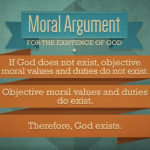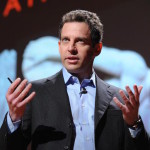Is Religion Evil? Secularism’s Pride and Irrational Prejudice
by Carl Olson
Filed under Christianity and Violence
The common wisdom in many circles (most located in certain cities on the East and Left Coasts) is that religion, in general, is a bad thing, and that in the hands of "fundamentalists," the Ku Klux Klan, neo-Nazis, and ultra-super-radical-Islamic terrorists, it is inevitably evil. Eliminating religion, it is then suggested or even openly argued, is a sure way to rid the world of evil. The term "religion," it should be noted, almost always refers to Christianity (or a form of pseudo-Christianity) and then, in some cases, to Islam.
An example of such thinking is the story of a film that documents the abuse of religion and the deadly bigotry that can flow from racists who twist the Bible for evil purposes. The Detroit Free Press reports on a showing of the documentary at Rochester College in Michigan and the reaction to it:
In the often-emotional discussion after the film, Rubel Shelly, a Rochester College professor who teaches courses on religion, told the crowd, "This startles me, aggravates me and humbles me. It scares the life out of me."
He said the film made him wonder about everything from the abuse of Christianity by white-supremacist groups like the Ku Klux Klan to the twisting of Islam by suicide bombers. "For me, the insight from this film is that religion can become downright evil," he said.
Based on these comments, one might conclude that the film is about "white-supremacist groups like the Ku Klux Klan" or "suicide bombers" or perhaps a crazed "fundamentalist" Christian who tried to bomb an abortion clinic. But the film (which aired on PBS in Michigan) is titled "Theologians Under Hitler: Could It Happen Again?":
The film focuses on several 1930s-era Protestant theologians in Germany who encouraged the rise of Nazism, publicly praising it as a gift from God to resurrect the impoverished German people. These men also added their moral weight to the attempted destruction of Judaism.
Among the most infamous was Gerhard Kittel, at the time a world-famous Protestant expert on the ancient history of the Bible. Far from a marginal figure or thug, like many of Hitler's early followers, Kittel taught at the centuries-old Tubingen University, the same school that later would have Joseph Ratzinger, later Pope Benedict XVI, on its faculty.
Reading this, a couple of questions come to mind. First, was Gerhard Kittel some sort of knuckle-dragging, half-witted "fundamentalist"? No, he wasn’t. On the contrary, he was a highly regarded and well-educated New Testament scholar who produced work – the ten-volume Theological Dictionary of the New Testament – that is still used today.
Secondly, if religion is proven bad because Kittel and some other Christians supported the Nazis, what was proven by the many Protestants and Catholics—including the much-maligned Pope Pius XII—who helped save hundreds of thousands of Jews? What about Hitler’s obsessive hatred of orthodox Christianity? Is religion itself really the problem? Specifically, when someone states that "religion can become downright evil," is he saying that religion inevitably leads to evil, or religious people commit the majority of evil acts, or that the religious impulse must be severely contained (or even destroyed)?
Sam Harris thinks so. The popular atheist author of The End of Faith: Religion, Terror, and the End of Reason (New York: W.W. Norton and Co., 2004) makes a passionate, if not convincing, case for the elimination of religion, namely (of course) Christianity and Islam. Lamenting that many people, including some public leaders, still take seriously Christian doctrine, Harris writes: "As we stride boldly into the Middle Ages, it does not seem out of place to wonder whether the myths that now saturate our discourse will wind up killing many of us, as the myths of others [terrorists] already have."
He then boldly insists that "faith" must go the way of the dodo bird: "We must find our way to a time when faith, without evidence, disgraces anyone who would claim it. … It is imperative that we begin speaking plainly about the absurdity of most of our religious beliefs" (47, 48). It comes as no surprise that Harris’s polemic is praised by Peter Singer, professor of bioethics at Princeton, who advocates infanticide and euthanasia and all else in-between (yet, irrationally, Singer spent much moneykeeping alive his mother, who is stricken with Alzheimer's disease).
Professor Shelly apparently missed Harris’s book (which was well-received among those who read The New York Times Book Review—"This in an important book"—and sleep in on Sunday mornings). Still, when a professor of religion states, "For me, the insight from this film is that religion can become downright evil," one can be forgiven for wondering what they have studied and if they have ever contemplated human nature, both by considering the actions/thoughts of others and examining their own actions/thoughts. Sure, there is a sense in which "religion can become downright evil," which is because people can become downright evil. As G.K. Chesterton rightly noted somewhere (the exact location escapes me), if you think the world is in bad shape you might be shocked how much worse it would be if Christianity weren’t around. And before anyone argues that it’s a completely subjective point, do check out The Black Book of Communism.
The problem many people have today is not that they deny outright the existence of evil, but that they deny they could have anything to do with evil. Sure, evil is personal and is committed by persons—but not by me. Yes, Hitler was human—but I’m different from Hitler. Some folks aren’t even comfortable at that distance, so they create more space by conceiving of evil as something done to them or forced upon them (usually by an institution) rather than a specific attack on the good and on others that humans can freely choose to commit. Another comment by Professor Shelly from the Free Press article points toward this second option:
Without a stricter separation of church and state, Shelly argued, "we can still allow ourselves as Christians to be played by political power," just as in Germany in the 1930s. At that point, he turned to Martin and asked, "So where are the religious leaders who are strong enough to resist the stroking of political power today?"
The implication, it seems clear, is that evil comes in the form of large, faceless, and frightening institutions—usually political—that force themselves on us. Strangely enough, a common (and sometimes warranted) criticism of some "fundamentalists" is that they have a conspiratorial mindset and operate out of fear of the Big, Bad Bogeyman (the U.N., the European Union, Hollywood, etc.). But if one feature of "fundamentalism" is an irrational, conspiratorial, and highly emotional fear of beliefs and institutions that we do not understand (nor try to understand), then "fundamentalism" is hardly limited to the realms of traditional Christianity, conservative politics, or Middle America. Nor is evil the sole property of a certain religion, political party, or ideology, even if a particular religion or ideology carries fuel that feeds the thought and actions of a person bent on committing acts of evil.
Admittedly, it is often difficult to see where religious teaching ends and adherence to that teaching begins. It becomes even more difficult when the teaching appears to be ambivalent or open to different interpretations. But to say, for instance, that a priest who molests a boy does so because of his religion (or, as it is sometimes argued, the unrealistic or "unnatural" disciplines of his religion) is to ignore that Catholicism condemns such an act. In the case of Kittel, I don’t know all of the influences—either theological or political—that shaped his thinking. But I know that nearly a million Jews were saved by the actions of Pope Pius XII, who acted in accord with the religious belief that all men are created in the image of God and that murder is evil. (And yet, when many people think of Christianity and Nazism, they also think of "Hitler’s Pope," a sad testament to the reality of evil attacks on truth.)
We can see the effects of this skewed thinking when confronted with the "solution" so often promoted by educators such as Professor Shelly, which is a "stricter separation of church and state." If that is the answer, look no further than the former Soviet Union to see what happens when the ultimate separation of church and state takes place—that is, when the state essentially destroys the church (and I use "church" here to mean an authentic body of Christians who don't give lip service the state to save their skins). The result is not just the eradication of traditional religion but also the establishment of a grotesque and bloody new religion—or anti-religious religion.
In the words of Simone Weil: "Marxism is undoubtedly a religion, in the lowest sense of the word. Like every inferior form of the religious life it has been continually used, to borrow the apt phrase of Marx himself, as an opiate for the people." Weil's remark is quoted in Raymond Aron's The Opium of the Intellectuals, a classic work of political reflection on radical politics, especially Marxism and Communism. In another work, The Dawn of Universal History,Aron (1905-1983)—a French intellectual who was once classmates with Sartre but chose a far different path from the famed existentialist—has a lengthy analysis of "The Secular Religions," which include Fascism, Nazism, Marxism, and Stalinism.
Aron writes that these secular religions "related everything—men and things, thoughts and deeds—to that ultimate end [the totalitarian goals of each respective political movement], and utility in terms of that end is the measure of all values, even spiritual ones. Partisans of such religions will without any qualms of conscience make use of any means, however horrible, because nothing can prevents the means from being sanctified by the end. In other words, if the job of religion is to set out the lofty values that give human existence its direction, how can we deny that the political doctrines of our own day are essentially religious in character?" He then points out how these secular religions provide an interpretation of the world, the meaning or source of suffering, salvation and the hope of a future utopia, and the demand of sacrifice by commitment to the "movement."
Oddly enough, Harris also recognizes the religious character of certain totalitarian ideologies, although his comments suggest that his reasoning is self-serving: "Consider the millions of people who were killed by Stalin and Mao: although these tyrants paid lip service to rationality, communism was little more than a political religion. … Even though their beliefs did not reach beyond this world, they were both cultic and irrational" (79; emphasis added). Readers are apparently expected to take on good faith that Harris is not just paying lip service to rationality, but hates religion for perfectly rational, scientific reasons.
The point is that every "ism"—even atheism, materialism, and the "pragmatism" endorsed by Harris—plays riffs based on the same tunes since man moves to a religious beat; to further the metaphor, man has music within him and longs to know the composer. He is, in other words, a religious animal who thinks religious thoughts and has religious impulses. In the words of Chesterton:
Every man in the street must hold a metaphysical system, and hold it firmly. The possibility is that he may have held it so firmly and so long as to have forgotten all about its existence. This latter situation is certainly possible; in fact, it is the situation of the whole modern world. The modern world is filled with men who hold dogmas so strongly that they do not even know that they are dogmas. It may be said even that the modern world, as a corporate body, holds certain dogmas so strongly that it does not know that they are dogmas. (Heretics, [Ignatius, 1986], p. 205).
So, one of dogmas (either conscious or otherwise) of avowed secularists is that religion is unreasonable and almost inevitably produces evil. Another is that some form of pure secularism (often described using terms such as "education," "progressive thinking," "enlightenment," "sophisticated," "scientific," and so forth) is the much-needed answer to the problems that plague humanity.
But Chesterton is correct in observing that there "are two things, and two things only, for the human mind, a dogma and a prejudice" (What’s Wrong With the World [Ignatius, 1987], p. 48), and that doctrine "is a definite point," while prejudice is "a direction." Religion, especially orthodox Christianity, is despised because it is a definite and specific faith. Instead of vague platitudes about love, the Christian Faith speaks of specific suffering and a definite Cross. Instead of hazy affirmations of the goodness of man, Catholicism teaches a specific doctrine of sin and makes definite moral demands.
And instead of a general appeal to "just get along," the Church insists on specific sacrifices and definite choices between good and evil—and bluntly says that all of us are capable of evil, regardless of how non-religious our religion might pretend to be.
Related Posts
Note: Our goal is to cultivate serious and respectful dialogue. While it's OK to disagree—even encouraged!—any snarky, offensive, or off-topic comments will be deleted. Before commenting please read the Commenting Rules and Tips. If you're having trouble commenting, read the Commenting Instructions.













